Asian Business First Podcast Summary: The risks and rewards of overseas properties
A landed property in KL only costs as much as a 4-room flat in Singapore. Singapore properties are getting too expensive and as a result, some may consider overseas properties. There are heavy stamp duties in Singapore and LTV ratios in recent times. Even if you have a SGD $1mil dollar, you can only get a shoebox condo, which isn’t a lot to speak of. If you don’t buy a second property in Singapore, for the stamp duties saved, you can get a freehold property in Cambodia for just 100k USD. However, for overseas properties, you need to consider exchange rates, government stability and capital appreciation, rental potential etc. In terms of potential, Europe, UK and Australia are still prime targets. One could also buy a home to look for investment, but also to stay there during retirement.
There are two groups of Singaporeans who buy overseas properties: one group is that they know the market, probably studied there; the other group is who have no clue and have not traveled there. They probably assume that if you invest in developing countries, then they think that they can make money, in line with the economic growth of the country. However, one must be cognizant of the risks. You will not know, when investing overseas, where the property is facing, and whether the vicinity is valuable. In Australia, foreigners can only buy properties under construction, and you can only sell to an Aussie local.
It certainly doesn’t mean that you stay in a place for a long time, means that you are very knowledgeable about property. It is important to get knowledge of the area you are planning to invest in. You need not buy property, as you could also buy ETF, REIT, which have exposure into the property sector, which has certainly a lower barrier to entry.
Vietnam is a very hot market right now. An average Singaporean can still invest in overseas properties due to the affordability. The concept of OPM (other people’s money) is important, which is rental yield. If you are able to rent out the property for 15 years, your property basically pays for itself. HDB has a 5 year MOP, and they cannot buy private residential properties, whether local or overseas properties. For Singaporeans, you can rent out your HDB, and stay in your private property, however this does not apply for PR.
For commercial properties, the rental tends to fluctuate, and so do the prices. UK and Australia are very popular among Singaporeans, when investing in properties.
Is there rental yield anymore? The rental market seems to be very dead in Singapore. There are quite a number of property developers moving overseas, like Oxley, Capitaland. Different countries also have interest rates. For property investment, you cannot speculate anymore due to the Additional Buyers’ Stamp Duty (ABSD), you should aim to keep a house for at least 5 years, and an average of about 10 years
Due to Brexit, UK properties could be undervalued at the moment, as there could be a distress to the market. Top emerging market picks are Vietnam, Cambodia and Manila, rental yields are 4 to 5%. New Zealand is quite anti-foreigners when it comes to buying properties, as they have strict regulations on that.

